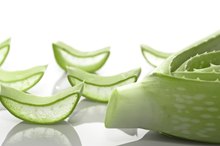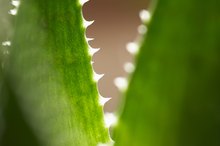Aloe Juice & Kidney Stones
Kidney stones are crystal deposits that accumulate in your kidneys or bladder. According to the University of Pittsburgh Medical Center, approximately 1 million Americans develop the condition each year 1. While doctors consistently encourage sufferers of kidney stones to follow a low-protein, high-fiber and high-fluid diet, herbalists claim that aloe juice may help reduce stone formation. Check with your physician, however, before embarking on any self-help therapy.
About Aloe
Native to Africa and cultivated worldwide, aloe, or aloe vera, reaches heights of 2 feet and bears spikes of yellow or orange flowers. The prickly, fleshy leaves of the plant contain two valuable substances -- gel and latex, or juice -- that constitute the source of aloe's medicinal powers. While aloe gel ranks as the favored topical treatment for skin conditions, aloe vera juice has historically lent itself as an internal treatment for digestive disorders.
Kidney Stones
Sticky Urine & Diabetes
Learn More
Kidney stones typically start in the center of your kidney as very small concentrations of calcium, uric acid and other substances in your urine 1. While small stones often pass unnoticed, over several years, as more material accumulates, large solid crystals can form and lodge in your urinary tract. Dislodged stones can cause:
- gripping pain
- blood in your urine
- chills
- fever
- sweating
- nausea
- vomiting
Aloe Juice-Kidney Stones Link
In addition, aloe provides aloemannan, a complex sugar that concentrates in your kidneys. According to Phyllis A. Balch, certified nutritional consultant and author of the book "Prescription for Herbal Healing," aloemannan stimulates production of healthy kidney cells while slowing the rate of crystal deposits that cause kidney stones 2. Balch recommends drinking 1/4 cup of aloe juice daily for no longer than two consecutive weeks.
Cautions and Considerations
Aloe Vera & Kidney Disease
Learn More
Aloe juice occasionally causes nausea, skin rash, discolored urine and liver dysfunction. Children and pregnant, lactating and menstruating women should avoid taking aloe juice internally, as should people with kidney or heart disease. Women who take birth control pills should also refrain from using aloe juice.
Related Articles
References
- University of Rochester Medical Center: Kidney Stones
- Prescription for Herbal Healing; Phyllis A. Balch
- Dat, A.; Poon, F.; Pham, K. et al. Aloe vera for treating acute and chronic wounds. Cochrane Database Syst Rev. 2012 Feb 15;(2):CD008762. DOI: 10.1002/14651858.CD008762.pub2.
- Haddad, P.; Amouzgar-Hashemi, F.; Samsami, S. et al. Aloe Vera for Prevention of Radiation-Induced Dermatitis: a Self-Controlled Clinical Trial. Curr Oncol. 2013 Aug;20(4):e345-8. DOI: 10.3747/co.20.1356.
- Heggie, S.; Bryant, G.; Tripcony, L. et al. A Phase III Study on the Efficacy of Topical Aloe Vera Gel on Irradiated Breast Tissue. Cancer Nurs. 2002;25(6):442-51.
- Langmead, L.; Feakins, R.; Goldthorpe, S.et al. Randomized, Double-blind, Placebo-controlled Trial of Oral Aloe Vera Gel for Active Ulcerative Colitis. Aliment Pharmacol Ther. 2004;19(7):739-47. DOI: 10.1111/j.1365-2036.2004.01902.x.
- Paulsen, E.; Korsholm, L.; and Brandrup, F. Double-blind, Placebo-Controlled Study of a Commercial Aloe Vera Gel in the Treatment of Slight to Moderate Psoriasis Vulgaris. J Eur Acad Dermatol Venereol. 2005:19(3):326-31. DOI: 10.1111/j.1468-3083.2004.01186.x.
- Suksomboon, N.; Poolsup, N.; Punthanitisarn, S. et al. Effect of Aloe vera on glycaemic control in prediabetes and type 2 diabetes: a systematic review and meta‐analysis. J Clin Pharm Ther. 2016;41(2):180-8. DOI: 10.1111/jcpt.12382
- Zhang, Y.; Liu, W.; Liu, D. et al. Efficacy of Aloe Vera Supplementation on Prediabetes and Early Non-Treated Diabetic Patients: A Systematic Review and Meta-Analysis of Randomized Controlled Trials. Nutrients. 2016 Jul; 8(7): 388. DOI: 10.3390/nu8070388.
Writer Bio
Susan DeFeo has been a professional writer since 1997. She served as a community events columnist for New Jersey's "Cape May County Herald" for more than a decade and currently covers the family and pet beat for CBS Philadelphia. Her health, fitness, beauty and travel articles have appeared in various online publications. DeFeo studied visual communications at SUNY Farmingdale.








